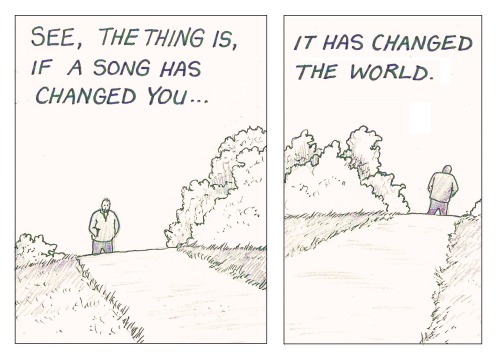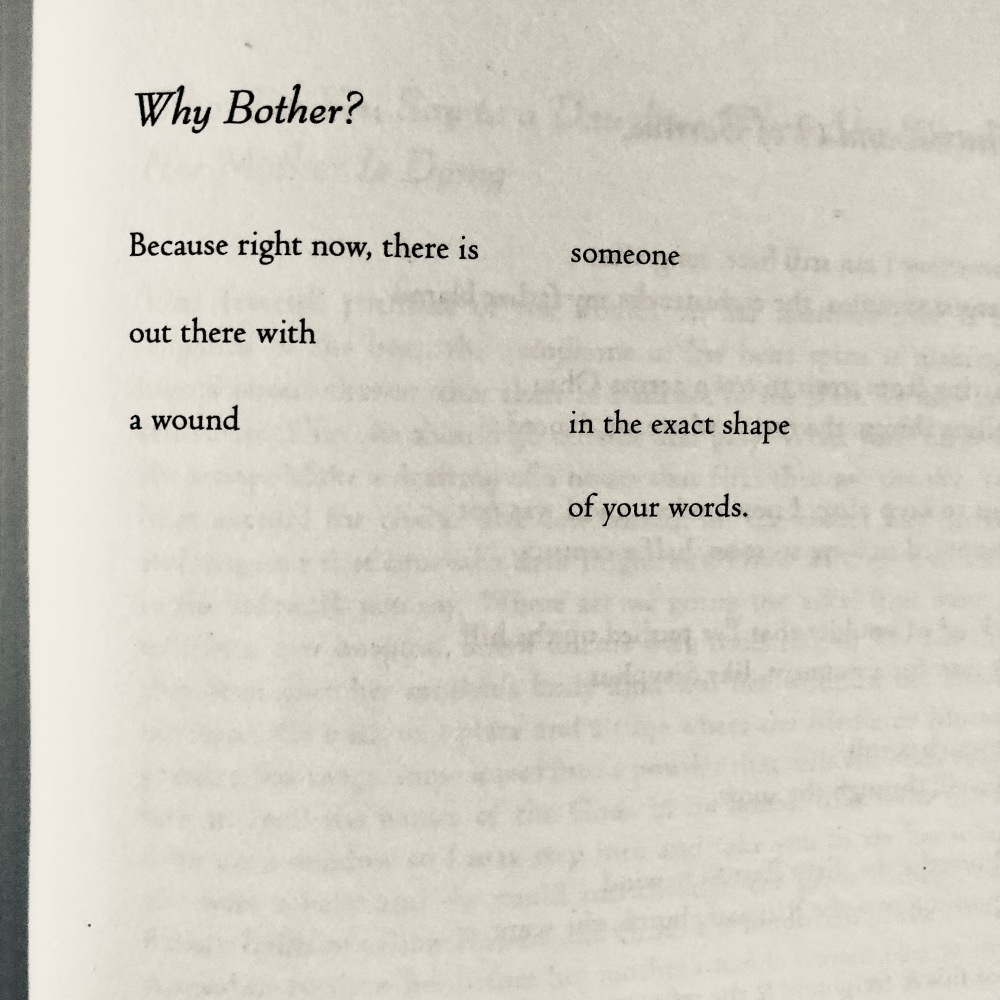by Jessie Lynn McMains
There’s a scene towards the end of the film Velvet Goldmine, when Curt Wild (Ewan McGregor) says to Arthur Stuart (Christian Bale): “We set out to change the world, and ended up just changing ourselves.” “What’s wrong with that?” Arthur asks. “Nothing,” Curt replies, “If you don’t look at the world.”
About seven years ago, I posted a page from my zine on my blog. It featured lyrics from the Wingnut Dishwashers Union song “Fuck Shit Up (whanana)“: A punk rock song won’t ever change the world / but I can tell you about a couple that changed me. My friend lachrimaestro drew this comic in response:

If you’re an artist, at some point or another you’re gonna find yourself singin’ the what-does-it-matter blues. The “why bother, everything is so messed up, my art1 won’t change anything, I should devote my time to something that would have a more positive effect on the world” blues.
The thing with the what-does-it-matter blues is, they always make you feel like they’re the last song you’ll ever sing. They can hit you whenever. They can hit you whether you’re well-established or a newbie; whether you have a thousand fans or no one knows who you are. They can hit whether art is your vocation or avocation; whether you’re making a decent living from it or struggling to get by.
It’s human nature to sometimes question yourself and what you’re doing, but it seems that artists do that kind of questioning more than most2. It doesn’t help that we in the U.S. live in a culture that both glorifies and denigrates art and artists. Our culture demands superhero blockbuster movies and auto-tuned Top 40 songs, but doesn’t realize none of those things would exist without artists. Everyone wants music in the airport lounge, and books at the airport bookstore, and then they turn around and tell artists that if we don’t want to eat pre-packaged ramen every night in our cockroach-infested hovels, we should get “real jobs.”
At the same time, people act like artists are rarified beings who lay around eating imported chocolates and sipping champagne all day3, until a bolt of inspiration strikes. Whereupon they rush to the typewriter or canvas or music room and produce a genius work of art all in one sitting. Because of this, it’s easy for people to assume that there’s no work involved in art; that writing or painting or composing a song isn’t a real job. That, because we’re not doctors or lawyers or bricklayers or electricians or… (what do these people consider to be “real jobs,” anyway?) what we do doesn’t matter, and we should feel bad about doing it.4
Oh, these blues run so deep. Because it’s not only your average non-artist that holds a false idea of the artist’s life. They’re not the only ones singing that we should feel guilty about what we do; or that it doesn’t matter. There are other voices in this chorus.
Like the ones of those who might admit that some art matters, but only certain types of art about certain themes. (Meaning: only art that they like, relate to, or agree with, about topics they deem important.)
Like the ones that got especially loud for me when I became a mom. The ones that say: “Continuing to pursue a writing career (and your other artistic avocations) rather than giving it all up to devote yourself to your kids is selfish.”
And so, so, so many others. Like the headlines spelling out the doom of pandemics and police brutality and climate change, which can make anyone wonder what use their novel or sculpture or rap song is in the face of all that. Like every rejection letter, every grant and residency given to someone else. Every rando on the Internet who leaves a shitty comment on something you made and shared. Anything that makes you feel like maybe some art matters, but yours doesn’t.
I’ve been thinking about this all a lot, recently. Many of my friends have been hit with a wave of why bother? I’ve been trying to boost their spirits by telling them the things that help me keep going, keep creating, when I am hit with the same.
I am also writing this for myself. A few weeks ago, I considered quitting writing and going back to school to become an environmental scientist. Never mind that I don’t actually want to be an environmental scientist, and that no matter what my day job is, I’ll still always create. I was certain, for a day or so, that this time I was gonna quit for good. I was ready to pack it up and pack it in and never write, (or paint, or make music) again. Like I said, these feelings can hit anyone, at any time. It’s so easy to sing these blues when everything conspires to make you feel that what you do is irrelevant at best, shameful at worst.
But I reminded myself of the things that help me lose the blues, that help me sing a different song.
I reminded myself that, if I go too long without making some kind of art, I get self-destructive. Even if what I create is useless, or if art is self-indulgent, destroying myself would be more so. What good am I to the world or anyone in it if I’m destroying myself?
I thought of that night in February 2017 when I realized art can change the world—it was a poetry reading that was more like a riot that was more like a party. The room was packed with rowdy poets. We stomped our feet and clapped our hands and beat on drums. We sang hymns of love and rage, and howled at the moon. We shouted swear words into the mic and spoke of resisting fascist tyranny and R.Q. said: “There’s a reason they come for the poets first.”
I remembered what Ariel Gore said:
That kind of thinking [that writers must alleviate their guilt for leading a creative life] is based on the idea that the creative life is somehow self-indulgent. Artists and writers have to understand and live the truth that what we are doing is nourishing the world. William Carlos Williams said, “It is difficult to get the news from poems yet men die miserably every day for lack of what is found there.” You can’t eat a book, right, but books have saved my life more often than sandwiches. And they’ve saved your life… But we don’t say, oh, Maya Angelou should have silenced herself because other people have other destinies. It’s interesting, because artists are always encouraged to feel guilty about their work. Why? Why don’t we ask predatory bankers how they alleviate their guilt?
And what James Baldwin said:
from an interview with Studs Terkel (1961)
…if you can examine and face your life, you can discover the terms with which you are connected to other lives, and they can discover them, too — the terms with which they are connected to other people. This has happened to every one of us, I’m sure. You read something which you thought only happened to you, and you discovered it happened 100 years ago to Dostoyevsky. This is a very great liberation for the suffering, struggling person, who always thinks that they are alone. This is why art is important. Art would not be important if life were not important, and life is important.
And what Natalie Goldberg wrote:
from Writing Down the Bones
We are important and our lives are important, magnificent really, and their details are worthy to be recorded.
I reminded myself of what Sarah Manguso wrote:
from “Green-Eyed Verbs” (New York Times)
The purpose of being a serious writer is not to express oneself, and it is not to make something beautiful, though one might do those things anyway. Those things are beside the point. The purpose of being a serious writer is to keep people from despair… If people read your work and, as a result, choose life, then you are doing your job.
And what Sean Thomas Dougherty wrote:

I thought of those times when someone has reached out to me and told me that one of my poems or songs, stories or zines, helped them through a hard time. Gave them something to live for, or made them feel less alone. When someone tells me that something I created changed their lives, it means more to me than any award or publication credit. Yes, that’s why art matters. That’s why I bother.
Next time I find myself singing those old why-bother blues, I’m going to stitch all this together into a new song. A song that tells me art nourishes the world, that it is important because our lives are important—magnificent, really. A song that matters because if it changes even one person, saves even one person from despair—even if that person is my own self—it has changed the world. And maybe it won’t save the world, but it makes the world worth saving. Sing it with me. Ignore the naysayers and join the chorus. We’ll howl it at the moon.
—
[1] I am using ‘art’ here to mean all forms of art: writing, visual art, film, theater, dance, music, et. al.
[2] I think a little questioning of one’s self and motives for doing what you do is healthy; it’s when it leads to shame and paralyzing self-doubt that it becomes a problem.
[3] What a confusing mix of stereotypes! How are we able to, on the one hand, live in luxury with our Vosges Haut-Chocolat and Dom Pérignon, and on the other hand, reside in dank basement apartments with a floor-mattress bed and only the rats for company? I suppose that’s why people so often pivot between saying “quit complaining and get a real job” and “it must be nice not to have a real job” to us.
[4] Of course, most of us do have jobs outside of and unrelated to our art/work. But I am speaking of stereotypes here.